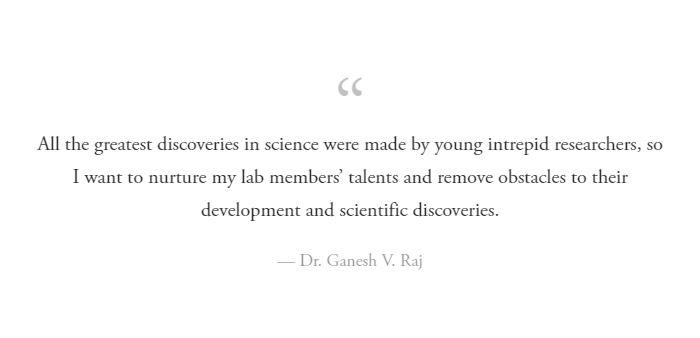The Mission of the Raj Lab is to:
-
Decipher mechanisms of therapy resistance
-
Develop biologically and clinically relevant models of cancer
-
Develop novel therapeutics against metastatic cancers
-
Develop the next generation of translational scientists
-
Decrease death and suffering from metastatic cancers

Begin With The End In Mind
Our goal is to advance science as rapidly as possible and bring forward therapies and technologies that may benefit patients with prostate cancer. We work with structural biologists, medicinal chemists, bioinformaticians, biochemists, molecular biologists, cell biologists, surgeons, pathologists, and mathematicians to develop biologically relevant models, to develop pharmacologically viable therapies, to dissect complex interwoven molecular mechanisms, and to identify the molecular drivers of oncogenic processes.
We are fortunate to have worked with an excellent group of scientific collaborators to bring forward our ideas and subject our research to the highest level of technical standards. We have learned a great deal from our collaborators and have given much back in return. We have written and successfully completed grants together, solved molecular puzzles, and have developed life-long relationships and deep friendships in this process. The journey has been and continues to be tremendously rewarding.
We have had a long-standing collaboration with Jer-Tsong Hsieh, Ph.D., UT Southwestern, and have shared resources in our ongoing effort to study prostate cancer. We have developed and are continuing to develop therapeutic agents with Jung-Mo Ahn, Ph.D., a medicinal chemist at UT Dallas.
We have a superb complementary, ongoing collaboration with Wayne Tilley, Ph.D., U. Adelade, Australia and have developed novel platforms for drug evaluation and discovery. We are working with Ralf Kittler, Ph.D., UT Southwestern; Bob Matusik, Ph.D., Vanderbilt University School of Medicine; and Steve Plymate, M.D., University of Washington, to develop novel therapeutics in prostate cancer. Our collaborative efforts have been rewarding and highly effective, and they have expanded our horizons beyond prostate cancer, as evidenced by our ongoing work in breast cancer with Jason Carroll, Ph.D., University of Cambridge, UK; Carol Lange, Ph.D., University of Minnesota; and Ratna Vadlamudl, Ph.D., UT Health Science Center, San Antonio.